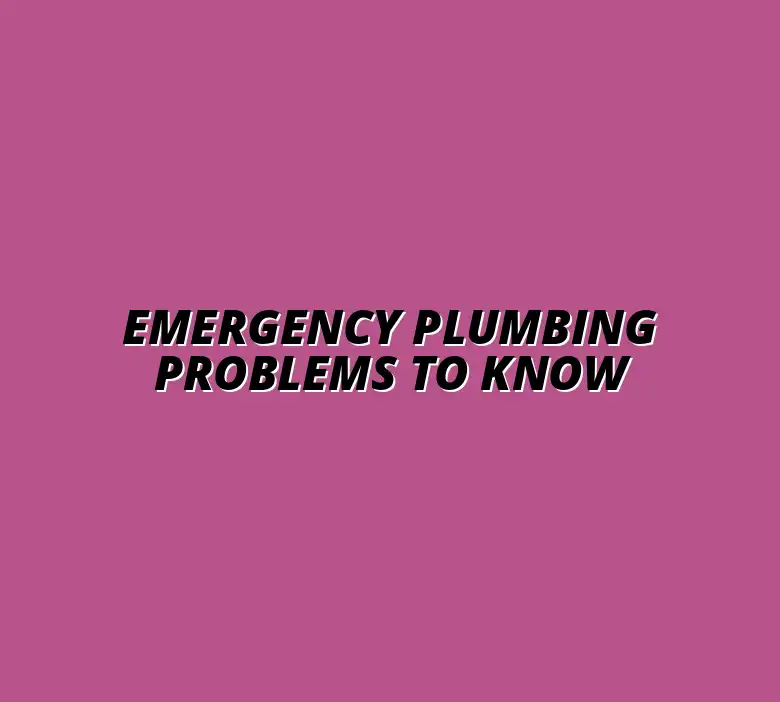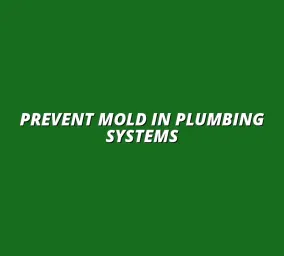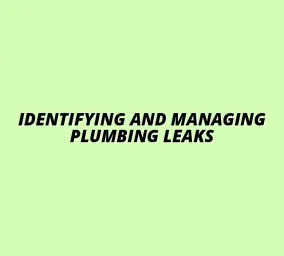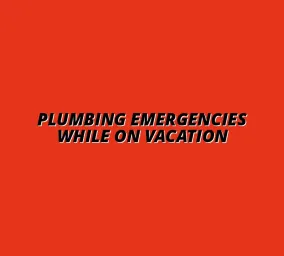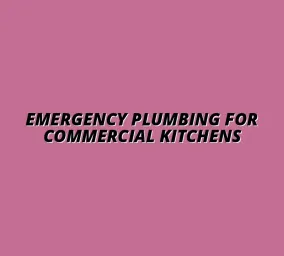Emergency Plumbing Problems to Know
Understanding Common Plumbing Problems and Their Impact
When it comes to home maintenance, understanding common plumbing problems is essential. These issues can lead to significant disruptions in our daily lives and often come with hefty repair costs. Being aware of the most frequent plumbing problems allows homeowners to take preventive measures and address issues before they escalate into emergencies.
In this section, we will explore common plumbing issues, the importance of addressing them promptly, and what homeowners can do to minimize their impact. By recognizing these problems early, we can maintain a safe and functional home environment.
The Importance of Addressing Plumbing Issues Promptly
Responding quickly to plumbing issues is crucial because even small leaks can turn into major problems if left unattended. When plumbing problems are ignored, they can lead to water damage, mold growth, and even structural issues in your home. Taking action early not only saves money but also keeps your home safe and comfortable.
It's essential to stay vigilant and address plumbing issues promptly. Here are a few key reasons why timely repairs matter:
- Prevents Water Damage: Addressing leaks quickly can save you from extensive water damage.
- Reduces Repair Costs: Fixing minor issues early is often less expensive than dealing with major repairs.
- Avoids Health Hazards: Mold and mildew can develop from prolonged water exposure, posing health risks.
How Delayed Repairs Can Lead to Emergencies
Ignoring plumbing problems can escalate into serious emergencies that require immediate attention. For instance, a small drip from a pipe can quickly turn into a flood, causing extensive damage to your flooring and walls. When repairs are delayed, you may find yourself facing inconvenient and costly emergency situations!
Some common emergencies that arise from delayed repairs include:
- Severe leaks that lead to flooding
- Pipe bursts that require immediate shut-off of water
- Backed-up sewage systems that pose health risks
Identifying the Signs of Plumbing Problems Early
Early detection of plumbing problems can save you time, money, and stress. Knowing the urgently plumbing emergency warning signs is crucial. There are several signs that homeowners should watch out for to catch issues before they worsen. Familiarizing yourself with these signs can help you take action quickly.
Here are some common indicators of plumbing issues:
- Unusual Sounds: Listen for strange noises like gurgling or hissing.
- Water Stains: Look for discoloration on walls or ceilings, which indicates leaks.
- Low Water Pressure: Noticeable drops in water pressure can signal blockages.
The Most Frequent Plumbing Issues in Residential Homes
Every homeowner will encounter plumbing issues at some point. Some problems are more prevalent than others, and knowing these can help you prepare. Understanding these issues also allows you to recognize when to call for help!
Here are some of the most frequent plumbing issues that occur in residential homes:
- Leaky faucets
- Clogged drains
- Pipe bursts
- Water heater failures
- Overflowing toilets
Leaky Faucets: Causes and Consequences
Leaky faucets are not only annoying, but they can also waste a significant amount of water over time. They may result from worn-out washers, loose parts, or corrosion. Ignoring a leaky faucet can lead to increased water bills and damage to your sink area.
To prevent leaky faucets, consider:
- Regular maintenance to check for wear and tear
- Replacing old washers and seals
- Using plumber's tape on threaded connections
Clogged Drains: Common Sources of Blockages
Clogged drains are a common issue that can disrupt your daily routine. Hair, grease, soap scum, and foreign objects can all contribute to blockages within your plumbing system. Regular maintenance and mindful practices can help prevent these annoying clogs!
Some effective ways to prevent clogged drains include:
- Using drain covers to catch hair and debris
- Avoiding pouring grease down the sink
- Regularly flushing drains with hot water and vinegar
Pipe Burst: Recognizing the Warning Signs
Pipe bursts are one of the most severe plumbing issues a homeowner can face. Recognizing the warning signs early can help you act quickly to minimize damage. Knowing how to repairing a burst pipe quickly is essential. Some of the signs to look for include:
- Unexplained water pooling or damp spots
- Changes in water pressure
- Unusual sounds coming from walls or floors
Factors Contributing to Pipe Bursts
Several factors can contribute to pipe bursts, including freezing temperatures, old and corroded pipes, and sudden changes in water pressure. These issues can weaken the integrity of your plumbing system, leading to disastrous results.
To prevent pipe bursts, it’s essential to:
- Insulate pipes in cold areas
- Regularly check for signs of corrosion
- Monitor your water pressure
Immediate Actions to Take When a Pipe Breaks
If you experience a pipe burst, acting fast is crucial to minimize damage. First, turn off the water supply to prevent further flooding. Next, locate the burst pipe and assess the damage.
Here are the immediate actions to take:
- Shut off the main water valve
- Drain any remaining water from the pipes
- Contact a professional plumber to repair the damage
Water Heater Failures and Their Impact on Households
Your water heater is essential for daily tasks, from showers to laundry. When it fails, it can significantly disrupt your household routine. Understanding the common signs of water heater issues can help you act before a complete breakdown occurs!
Some signs that your water heater may need attention include:
- Inconsistent water temperatures
- Strange noises coming from the unit
- Visible leaks around the heater
Identifying Signs of Water Heater Issues
Recognizing the early signs of water heater issues can prevent unexpected cold showers and costly repairs. Regular monitoring can help you identify when your heater is struggling to perform. Regular checks, as described in our guide to regular bathroom water heater checks, are vital. When you notice any changes, it’s wise to investigate further.
Here are some indicators of potential water heater problems:
- rusty or discolored water
- Unusual odors coming from hot water
- Increased utility bills without explanation
Emergency Steps When the Water Heater Fails
If your water heater fails, it’s essential to know what to do next. Start by turning off the power supply to the unit to prevent any hazards. If there is a leak, you’ll want to turn off the water supply to avoid further damage. Knowing how to fix a leaking water heater can be invaluable.
Follow these emergency steps:
- Turn off the electricity or gas supply
- Shut off the water supply
- Contact a qualified technician for repairs
Overflowing Toilets: Causes and Solutions
An overflowing toilet is one of the most frustrating plumbing issues a homeowner can face. It can cause water damage and create a mess in your bathroom. Understanding the common triggers can help you address this issue effectively!
Common causes of overflowing toilets include:
- Clogs in the toilet or drain
- Faulty float valves
- Blocked vents that prevent proper drainage
Understanding the Common Triggers for Toilet Overflows
Recognizing what causes toilet overflows can help you take preventive measures. Regular maintenance and mindful practices can keep your toilet in good working order. The best line of defense is being aware of the following:
- Limiting what goes into the toilet
- Using plungers or augers to clear clogs
- Regularly checking the mechanisms inside the tank
Coping Strategies for Immediate Relief
If you find yourself facing an overflowing toilet, remain calm! There are steps you can take to alleviate the situation. First, turn off the water supply to prevent more water from entering the bowl.
Here are some coping strategies to manage an overflow:
- Use a plunger to try and clear the clog
- Remove the tank lid and adjust the float valve
- Call a plumber if the issue persists
Preventive Measures to Reduce Emergency Plumbing Situations
Taking proactive steps to maintain your plumbing can significantly reduce the likelihood of emergencies. Regular check-ups and maintenance can save you time and money in the long run. Implementing the tips in our guide on preventing plumbing emergencies with maintenance can be highly beneficial. Here are some simple preventive measures you can implement!
Consider the following preventive strategies:
- Regularly inspect your plumbing fixtures for leaks
- Flush drains with hot water to remove buildup
- Schedule professional plumbing inspections at least once a year
Routine Plumbing Maintenance Tips
Routine maintenance is key to preventing plumbing emergencies. Simple actions can go a long way in ensuring your plumbing system functions smoothly. Here are some easy maintenance tips you can follow:
- Check for leaks in exposed pipes
- Clean aerators in faucets to avoid low water pressure
- Inspect your water heater for rust or leaks
Importance of Regular Inspections by Professionals
Having a professional plumber conduct regular inspections is essential. They can identify potential issues that you may overlook, allowing for timely repairs. Investing in professional help can save you money by avoiding larger problems down the line. For Birmingham residents, consider checking out plumber in Brandwood End Birmingham.
Here’s why regular inspections matter:
- Early detection of hidden leaks
- Professional advice on plumbing issues
- Peace of mind knowing your plumbing is in good shape
Addressing Frequently Asked Questions About Plumbing Emergencies
What Should I Do First in a Plumbing Emergency?
When faced with a plumbing emergency, your initial response can greatly impact the situation. It’s essential to act swiftly to minimize damage and prevent further issues. First, turn off the water supply to the affected area to stop the flow of water.
Next, gather any tools or materials that could help manage the situation, such as towels, buckets, or a wet/dry vacuum. Additionally, if there’s leaking water, make sure to contain it to prevent damage to your home’s structure and belongings.
- Turn off the main water supply.
- Contain any leaks with buckets or towels.
- Check for electrical hazards and avoid contact with standing water.
When to Call a Professional Plumber
While some situations may seem manageable, certain plumbing emergencies require professional assistance. If you’re unable to stop the leak or if the problem seems beyond your expertise, don’t hesitate to call a licensed plumber. Their expertise can save you time, money, and stress.
Moreover, if you notice signs of a severe issue, such as low water pressure or discolored water, it’s best to let professionals handle it. Remember, timely intervention can prevent worsening problems!
How Can I Identify Plumbing Problems Before They Escalate?
Being proactive about plumbing issues can save you from larger emergencies later. Familiarizing yourself with common warning signs is a great place to start. Regularly check for leaks under sinks, around toilets, and along pipes in your home.
Other signs of plumbing problems include unusual noises such as dripping, gurgling, or banging, as well as unexplained increases in your water bill. Staying alert to these changes can prevent small issues from becoming major headaches!
- Look for water stains on walls or ceilings.
- Monitor your water bill for unexpected spikes.
- Listen for unusual noises in your plumbing system.
Tools and Techniques for DIY Inspections
Identifying plumbing issues before they escalate can be done effectively with the right tools. A flashlight is handy for inspecting dark areas under sinks or behind appliances. A simple plunger can also help troubleshoot minor clogs in drains.
Additionally, use a water pressure gauge to measure the pressure in your pipes. Low pressure can indicate a leak, while excessively high pressure can lead to pipe damage. Regular DIY inspections can help maintain your plumbing!
What Are the Most Costly Plumbing Emergencies?
Understanding which plumbing emergencies can be the most costly is vital for homeowners. Among the top concerns are burst pipes, which can cause extensive water damage and mold growth. Other expensive issues include sewer line backups that require professional excavation and repair. Preventing pipe corrosion is a key preventative measure.
Additionally, plumbing emergencies involving water heater failures can lead to costly replacements if not addressed promptly. Being aware of these potential costs can motivate you to keep your plumbing in check and take preventive action.
- Burst pipes
- Sewer line backups
- Water heater failures
Insurance Considerations for Plumbing Emergencies
When dealing with plumbing emergencies, it’s crucial to understand your homeowner's insurance policy. Many policies cover water damage from sudden incidents but may exclude damages caused by neglect or wear and tear. Always review your coverage and consider additional riders for plumbing-related issues.
Documenting any damage and keeping records of repairs can assist in claims processing if you ever face a major plumbing emergency. Being prepared can save you from unexpected expenses later!
Building Awareness of Local Plumbing Services
Finding reliable emergency plumbing services can be a daunting task, especially in urgent situations. Start by asking friends and family for recommendations. Online reviews and ratings can also provide insight into the quality of local plumbers.
Moreover, check if the plumbers you consider are licensed, insured, and have good customer feedback. This way, you can feel confident about your choice when an emergency arises!
- Ask for recommendations from trusted sources.
- Read online reviews and ratings.
- Verify licenses and insurance of local plumbers.
Reviews and Recommendations for Local Plumbers
In today’s digital age, researching local plumbing services has never been easier. Websites like Yelp, Angie's List, and Google Reviews can give you a clearer picture of a plumber’s reputation. Look for feedback regarding response time, quality of work, and customer service.
Don’t hesitate to reach out to potential plumbers for references or examples of their previous work. This knowledge can help you make a more informed decision when choosing a plumbing service to trust!
Practical Tips for Maintaining Plumbing Systems
Best Practices for Home Plumbing Systems
Taking care of your home plumbing system is essential for preventing emergencies. Regular maintenance can save you time, stress, and money in the long run. Simple steps include checking for leaks, monitoring your water pressure, and keeping drains clear of debris.
Additionally, be mindful of what goes down your drains. Avoid flushing items that can cause clogs, such as wipes, grease, or hair. Small habits can keep your plumbing running smoothly!
- Inspect for leaks regularly.
- Monitor water pressure levels.
- Clear drains of debris frequently.
Effective Ways to Prevent Common Plumbing Problems
Preventing plumbing problems is often easier than fixing them. Use drain screens to catch hair and debris, and regularly clean your pipes with a mixture of vinegar and baking soda. This can help prevent buildup and keep your drains flowing freely.
It’s also a good idea to insulate your pipes in colder months to prevent freezing and bursting. These small steps can prevent significant headaches down the line!
Final Thoughts on Plumbing Preparedness
Creating a plumbing emergency plan for your home is essential for all homeowners. This plan should include contact information for your local plumber, steps to take during an emergency, and a list of emergency supplies you may need. Being prepared can make all the difference when issues arise.
Encouraging proactive maintenance is just as important as having a plan. Regular check-ups and repairs can greatly reduce the likelihood of emergencies, saving you time, money, and stress in the future. Take charge of your plumbing today!

